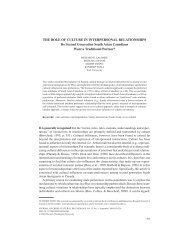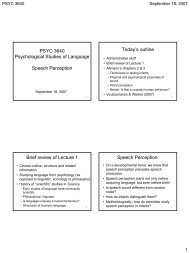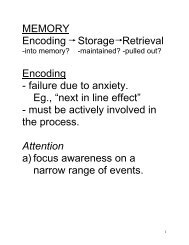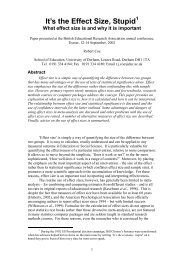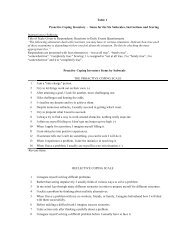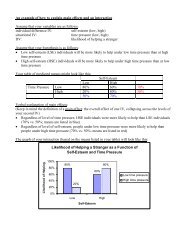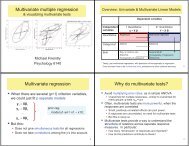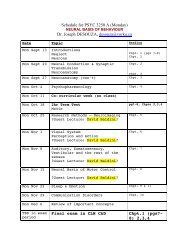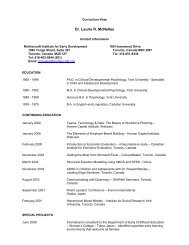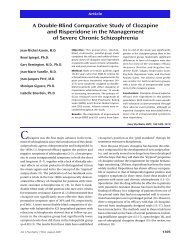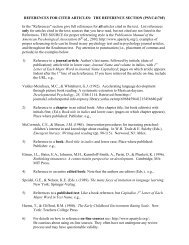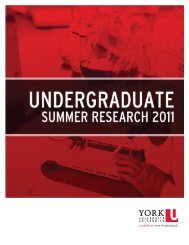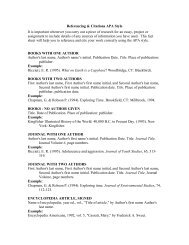The Drama of the Gifted Child (The Search for the True Self)
The Drama of the Gifted Child (The Search for the True Self)
The Drama of the Gifted Child (The Search for the True Self)
Create successful ePaper yourself
Turn your PDF publications into a flip-book with our unique Google optimized e-Paper software.
In order to lay <strong>the</strong> groundwork <strong>for</strong> a description <strong>of</strong> <strong>the</strong>se<br />
patients' psychic climate, I first will <strong>for</strong>mulate some basic<br />
assumptions, which will provide us with a starting point<br />
and are close to <strong>the</strong> work <strong>of</strong> D. W. Winnicott, Margaret<br />
Mahler, and Heinz Kohut.<br />
• <strong>The</strong> child has a primary need to be regarded and respected<br />
as <strong>the</strong> person he really is at any given time, and as <strong>the</strong><br />
center—<strong>the</strong> central actor—in his own activity. In contradistinction<br />
to drive wishes, we are speaking here <strong>of</strong> a<br />
need that is narcissistic, but never<strong>the</strong>less legitimate, and<br />
whose fulfillment is essential <strong>for</strong> <strong>the</strong> development <strong>of</strong> a<br />
healthy self-esteem.<br />
• When we speak here <strong>of</strong> "<strong>the</strong> person he really is at any given<br />
time," we mean emotions, sensations, and <strong>the</strong>ir expression<br />
from <strong>the</strong> first day onward. Mahler (1968) writes:<br />
"<strong>The</strong> infant's inner sensations <strong>for</strong>m <strong>the</strong> core <strong>of</strong> <strong>the</strong> self.<br />
<strong>The</strong>y appear to remain <strong>the</strong> central, <strong>the</strong> crystallization<br />
point <strong>of</strong> <strong>the</strong> 'feeling <strong>of</strong> self around which a 'sense <strong>of</strong><br />
identity' will become established." (p. 11)<br />
• In an atmosphere <strong>of</strong> respect and tolerance <strong>for</strong> his feelings,<br />
<strong>the</strong> child, in <strong>the</strong> phase <strong>of</strong> separation, will be able to<br />
give up symbiosis with <strong>the</strong> mo<strong>the</strong>r and accomplish <strong>the</strong><br />
steps toward individuation and autonomy.<br />
• If <strong>the</strong>y are to furnish <strong>the</strong>se prerequisites <strong>for</strong> a healthy<br />
narcissism, <strong>the</strong> parents <strong>the</strong>mselves ought to have grown<br />
up in such an atmosphere.<br />
• Parents who did not experience this climate as children<br />
are <strong>the</strong>mselves narcissistically deprived; throughout <strong>the</strong>ir<br />
lives <strong>the</strong>y are looking <strong>for</strong> what <strong>the</strong>ir own parents could<br />
not give <strong>the</strong>m at <strong>the</strong> correct time—<strong>the</strong> presence <strong>of</strong> a<br />
person who is completely aware <strong>of</strong> <strong>the</strong>m and takes <strong>the</strong>m<br />
seriously, who admires and follows <strong>the</strong>m.<br />
• This search, <strong>of</strong> course, can never succeed fully since it<br />
relates to a situation that belongs irrevocably to <strong>the</strong> past,<br />
namely to <strong>the</strong> time when <strong>the</strong> self was first being <strong>for</strong>med.<br />
• Never<strong>the</strong>less, a person with this unsatisfied and unconscious<br />
(because repressed) need is compelled to<br />
attempt its gratification through substitute means.<br />
7



